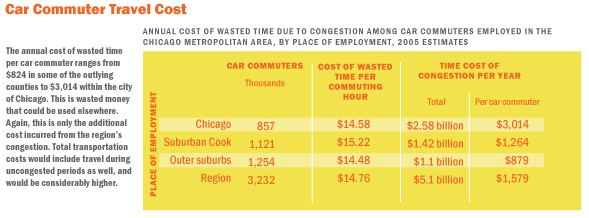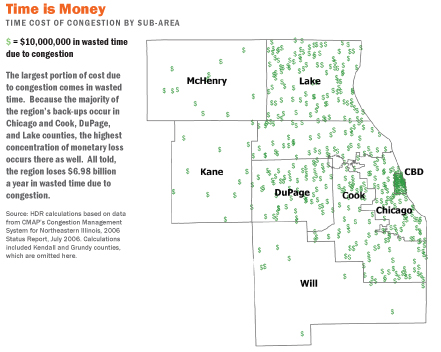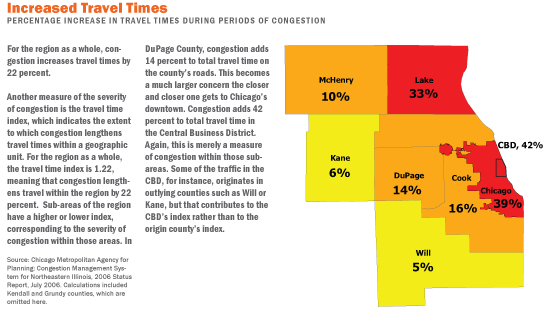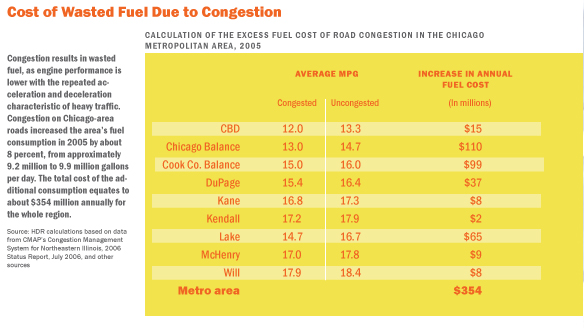Many of the strains that congestion inflicts on individuals and families are difficult, if not impossible, to quantify. What is the cost of the stress generated by being stuck in traffic? What is the cost of missing a child’s soccer match, or not getting to the store before it closes?
However, other measures are much more readily assessed. Commuters and other drivers lose time on the roads, which has a significant cost, and the amount of wasted fuel is a very tangible concern. Congestion also adds uncertainty to the commute, and to other travel, leading drivers to build additional time into their schedules in the event that traffic jams occur. This is time that could otherwise be spent working, shopping, or relaxing.

Wasted time costs money
Each vehicle-hour lost to congestion has an assumed cost of $24.03. Assuming 250 days of congested travel per year (i.e., excluding weekends and holidays), for 2005, the estimated total cost of congestion in wasted time amounts to $6.98 billion for the metropolitan area. While most people tend to think about wasted fuel when they think of congestion, the cost of lost time is almost 20 times greater for the region.
The time commuters lose to congestion accounts for the major share of the total cost of congestion on Chicago-area roads. In 2005, gridlock increased the overall cost for commuting by car to workplaces in the Chicago metropolitan region by about $5.1 billion. This amounts to nearly two-thirds of the region’s estimated $7.3 billion annual total. However, evidence from a National Cooperative Highway Research Program study of tolled express lanes in southern California suggests that $20 per hour might be a more accurate measure of the value of personal travel time than the U.S. DOT’s measure of $14.75. A value of $20 per hour would increase the total cost of congestion in the Chicago area by 24 percent, to $9.0 billion.

Understanding the numbers
The average value of time per vehicle-hour, $24.03, was calculated as a weighted average of the values for each of the three categories of travel based on their relative percentage of vehicle miles traveled: commercial truck ($67 per hour), other business ($38), and personal ($14.75), including commuting; while the other 15 percent captures all “on-the-clock” driving, such as deliveries and trips to meetings.

Congestion increases travel uncertainty
The increased uncertainty the threat of congestion creates also has costs, though it is difficult, if not impossible, to assign a dollar figure to it. The lack of reliability in travel times leads travelers to include additional buffer time in their plans, particularly for travel during the morning period, when commuters are concerned about lateness to work. This is not an uninformed gamble, but one informed by experience. CMAP has estimated a variation in traffic volumes and speeds by time of day on selected roadways. This conforms to the normal pattern of morning and afternoon traffic peaks, with the dominant peak — morning or afternoon — being corridor-specific. For example, to travel the Stevenson Expressway northbound from Naperville Road to I-294 normally takes under 15 minutes during the off-peak versus about 22 minutes during the height of the morning peak and 20 minutes during the height of the afternoon peak. On some days, however, travel during the peak periods can take much longer. The 95th percentile in the distribution of travel times is between 30 and 35 minutes during the morning and afternoon peaks, an effective doubling of off-peak travel times. One result of this is the morning peak starts early, with travel times on the Stevenson Expressway increasing rapidly around 6:00 a.m.
Congestion increases fuel costs
The annual increase in fuel costs per peak period traveler in 2005 came to $81. That includes all peak period traffic, not simply commuters. Again, this is the extra amount of money spent on gas as a result of congestion. Gas prices have risen considerably since 2005, and are expected to continue rising. At current fuel prices (July 2008), the increase in annual fuel cost incurred by congestion is $681 million.

Understanding the numbers
The cost of wasted fuel was estimated using average speeds under congested and relatively uncongested conditions, and TTI’s equation for miles per gallon. The cost of gasoline was set at $1.88 per gallon, the average Illinois retail price in 2005 (the reference year for all calculations in this analysis) minus federal, state and local taxes.
Policy Implications
Congestion does not simply cost people time and money, it wastes both. For most people there is no benefit gained from excessive congestion.
Strategies to mitigate regional congestion must:
-Reduce the number of lost hours and amount of gas that literally goes up in
smoke.
-Increase certainty about travel times.
-Provide people with more transportation choices.
Strategies to mitigate congestion may include some kind of toll to price more accurately the utility of traveling without excessive traffic. It is important to remember these tolls, which would appear to be an additional cost, would serve to eliminate partially or wholly the wasted time and money that congestion creates. Variable tolling schemes that determine tolls based on the level of traffic might help to maintain a more even flow, thereby increasing people’s confidence about travel time.
While some would say congestion is the result of people choosing to drive, it is equally accurate to view congestion as the result of a lack of choice. A prime example is a mass transit network that more efficiently moves people to and from home, work, stores, schools, and other transportation hubs to give people more choice in how to get around.
Return to the main page of Moving at the Speed of Congestion .